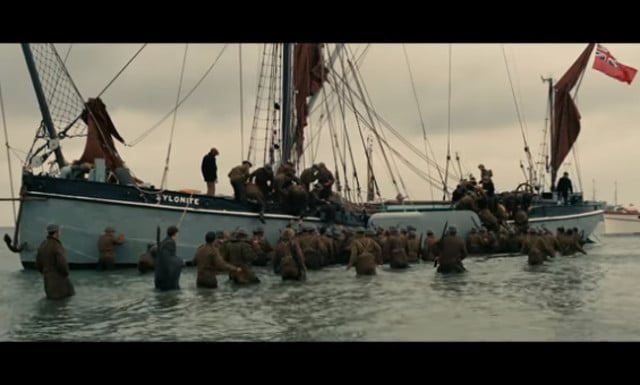Thanks in part to the cartoon The Simpsons the role of the French in World War Two is often reduced that of “cheese eating surrender monkeys”.
But there was hope in France that Christopher Nolan’s blockbuster film “Dunkirk”, which focuses on the “miraculous” evacuation of 300,000 British soldiers trapped on a northern French beach, would go a little way to setting the record straight by presenting an alternative image of France’s much-maligned military efforts in World War Two.
In the run up to the release of the film the French press noted the “Anglo-Saxons have an unpleasant tendency to put forward the feats of the British army and pass over those of the French army.”
Respected historian Dominique Lormier, who is “one of a number of historians who are reinterpreting the events of May-June 1940” in order to better portray the bravery of French soldiers said in the run up to the release of Dunkirk: “I hope that this film will highlight the sacrifice of the 30,000 Frenchmen who prevented the surrender of the British troops who would have been unable to defend the territory.”
Those 30,000 French soldiers were vastly outnumbered by the 160,000 German soldiers who had advanced like lightning through northern France. The French paid a heavy price. Those that survived were captured and sent to prison camps.
Elsewhere Lormier writes: “By its heroic sacrifice the French army did indeed save Great Britain from defeat. It was a tactical and strategic defeat for Hitler who could not then force Britain to negotiate a separate peace.”
A British government memo sent out at the time that was later released by the BBC also hails the role of the French soldiers.
“The Ministry of Information have written the following for such use as we wish to make of it,” reads the memo.
“As the British people watch with pride and admiration the home-coming of their BEF (British Expeditionary Force) their feelings go out no less to their heroic French Allies whose Marines, under their Admiral Abrial are holding the gateway to safety at Dunkirk, whose Navy is sharing with the British the dangerous task of convoying the rescued soldiers to England, and above all, whose soldiers under General Prioux occupying as they do, the positions of greatest danger in the rear-guard of the Allied retreat, are still hewing their way against overwhelming odds to the coast.”
But French hopes that their army’s heroics would be truly reflected in Nolan’s blockbuster appear to have been dashed, if Le Monde newspaper's fairly harsh review of the film is anything to go by.

France’s newspaper of reference accuses the British director of being “witheringly impolite” and “indifferent” towards France by disregarding the role it played in “miracle of Dunkirk” in May 1940.
Reviewer Jacques Mandelbaum writes that one of many reservations he has with the film is that the plot is “purely British”.
He notes there are “a dozen seconds devoted to a group of French soldiers defending the city who were not very friendly and a few more to a French soldier disguised as British in order to try to flee the massacre.”
“That does not account for the indispensable French involvement to this crazy evacuation,” he writes.
“No one can deny a director’s right to focus his point of view on what he sees fit, as long as it does not deny the reality of which it claims to represent.
“Where in the film are the 120,000 French soldiers who were also evacuated from Dunkirk? Where are the 40,000 who sacrificed themselves to defend the city against a superior enemy in weaponry and numbers?”
Continuing on Mandelbaum, perhaps going a little too far, asks why the French army who fought the Germans at Lille and prevented the Wehrmacht from heading to Dunkirk are not reflected in the film?
And finally he asks “where is Dunkirk itself?” Half destroyed by bombardments, but rendered invisible in the film.”
Le Monde laments that “a rare moment in the war which honours the heroism of the French army” is still not worth representing.
So it's worth being reminded of the words of Britain's wartime Prime Minister Winston Churchill who wrote: “The heroic resistance of the French army saved the British and allowed them to continue the war,” wrote Churchill after the war.”
If reviews are anything to go by then Nolan's film is well worth watching but for an alternative view of what happened this film clip is also worth viewing.



 Please whitelist us to continue reading.
Please whitelist us to continue reading.
Member comments